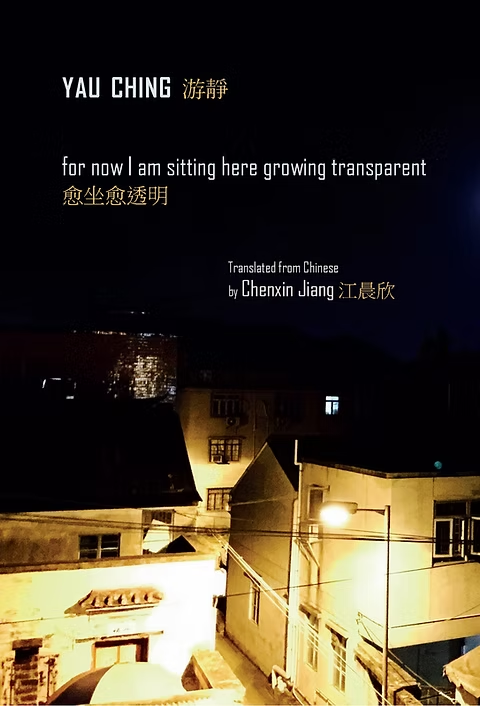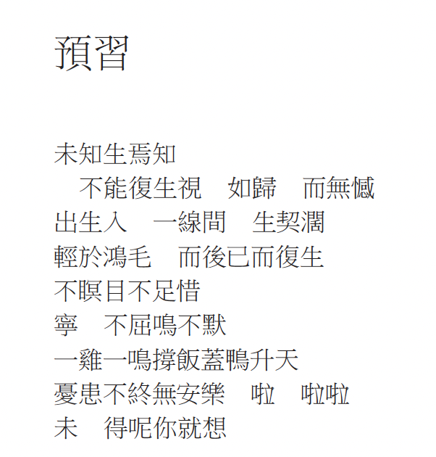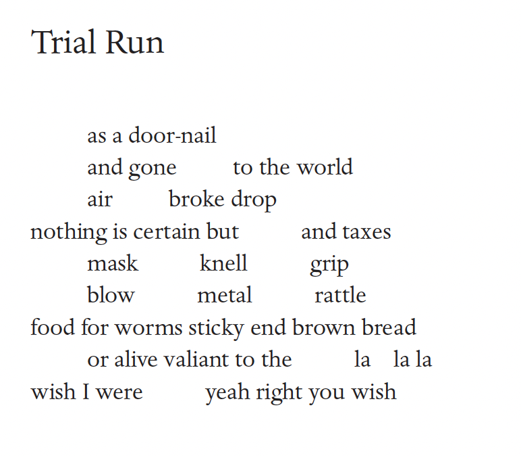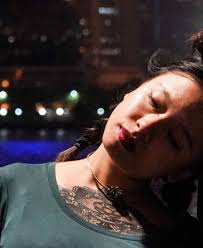Tim Tim Cheng explores a world where endings and beginnings are inseparable in Yau Ching’s for now I am sitting here growing transparent (Zephyr Press, 2025).

Bilingual books curate a space of generosity. Placing work in the source language and target language side by side invites cross-cultural exchange. While monolingual readers must navigate unfamiliar sightlines, bilingual readers may engage more intimately with the creature that we call translation – a being that lives between and beyond two languages. Translated by Chenxin Jiang, Yau Ching’s for now I am sitting here growing transparent interrogates the interconnectedness between the human and non-human, word and world, where play manifests as intimacy, and intimacy as resistance. Through urban anti-eclogues, Yau Ching dances with death in its many masquerades.
And What’s Normal, Anyway?
The collection is divided into four sections: ‘Home 家’, ‘You 妳’, ‘Prose Poems 散文詩’, and ‘Death and Adventure 亡命與半途’. Each opens with a photograph of womxn – some distracted or forlorn in claustrophobic, tattered urban settings; some nonchalant, even lustful, in bridal veils and tiaras against studio backdrops. These images reflect Yau’s multimodal cosmovision, shaped by her well-wrought hybridity as a queer filmmaker, newspaper columnist, and academic across New York, Tokyo, Taiwan, and British-colonial and post-Handover Hong Kong.
Yau does not wait to problematize normality. In ‘Hong Kong Malady’: ‘health itself is just numbness / deadness to the world’, suggesting that our awareness of the world – of its injustices, its alienations – can itself be a kind of sickness. This calls to mind Sanah Ahsan’s analogy rooted in liberation psychology: ‘If a plant were wilting we wouldn’t diagnose it with “wilting-plant-syndrome” – we would change its conditions’ (2022). We are only as healthy as our environments.
The Last ‘No’!
Though a sense of crisis simmers throughout the book, Yau maintains an erudite, critical voice with a lightness of touch. She acknowledges complicity in late-capitalistic, neo-liberal societies. In ‘No city’, ownership is illusory, and language – like the world’s order – fractures:
Whenever I visit a city
I think about buying a flat
Whenever I go to a new place
I think about settling down
I’m looking for what I imagine
the doable can’t be attained
impossible human
[…]
So many people
there’s no way to live
what’s left is no thing
that makes us
no body
if not a body
then just a no
After serial negations, the last ‘no’ lands somewhere between despair and transcendence. I recall the Buddhist idea of ‘emptiness’, where the ‘non-self’ exists in a ‘neither the same nor different’ relation with everything else (Ziporyn, 2014). This aligns with Hong Kong’s ‘political ecology’ and ‘translational activities’, where, as Zhao and Geng write, ‘progression of human history can be viewed as a movement towards an even greater loss of control over the processes that affect human beings and their environment’ (2024).
Blurred Lines
In the translator’s note, ‘Yau Ching’s Self-Translating poems’, Jiang elucidates that Yau writes ‘in Cantonese-inflected standard Chinese’. To translate this work into English, Jiang notes, is ‘to bring them into a space that they already uneasily inhabit’. Though most Hong Kongers ‘speak Cantonese as their main language’, ‘English was [Hong Kong]’s only official language’ until 1974, when Chinese was formally recognised. In ‘You and Us’, Yau writes:
Modernity colonized you
You want to be us but
you despise us
Colonialism modernized us
It wrote literature backbone trust and history
into commerce reason the nimble formula of rule
of law of the only impartial
free place where Chinese people and foreigners lived together
inside us while we
have never been modern
[…]
We’re used to
debris facing backwards while being dragged forward
[…]
we are
debris layer upon layer of skin and flesh with pickled vegetables
flayed from us picked clean
feed our crippled ruined city
spouting red bubbles if you think for a minute you’ll wonder
why your flowers are
so red today
Here, Yau blurs the distinction between the human, non-human, and spatial, depicting a cyclical relationship between history and nature. ‘You’ and ‘we’ stare at each other only to find a mirror: ‘Modernity colonized you’ / ‘Colonialism modernized us’. Symbiosis becomes parasitic. Our ‘bubbl[ing]’ blood nourishes ‘your flowers’. Alienated, abstracted into a vessel, ‘we’ come to the collapse of linear time: ‘Chinese people and foreigners lived together / inside us […] / We’re used to / debris facing backwards while being dragged forward’.
Playtime.
In ‘Queerness as Translation‘, Mary Jean Chan writes: ‘I want, instead, to inhabit a state of play – a form of playtime – where time dissolves and there is only being, breath, and the myriad of languages we allow ourselves to inhabit and speak’. Yau’s work, too, longs for such play, a dissolving into one’s surroundings. In ‘Spacetime’:
Time is like a shadow on the road
The English word longing has length in it
I long—long——for you
My sleeves pant legs lengthen fingers and toes lengthen
every single hair on my head and brow
stretches downwards trailing on the ground like banyan roots
[…]
Loneliness in Chinese is empty
An empty sheet of lined paper
“Hey you, three more love poems!”
translucent it has no shadow
the world is big and for now I am
sitting here growing transparent
No words can fill up
how empty I am on all sides
and in front and behind, how long
The poem’s irregular rhythms evoke a kind of stretching – of time, body, longing. In ‘Moon’, the poem plays with homonyms: the lover’s name, ‘Mona’, echoes the Chinese homonyms ‘moon’ and ‘month’ (月). Linear time and collective progress are abandoned in favour of individuals’ proximity and tenderness:
why does our way of telling time
always forget the moonlight?
I’ve no way to complete the circles of life
when planting
onions and peppers and perillas
In this moment your hair is splattered like a Pollock autumn
sliding
into a time that’s neither yours nor mine
someone is busy talking about stars expanding, which is to say contracting
while we spin like spaghetti in a black hole
The Final Word
Yau elevates the carnal to something more-than-human. Urban sensualities do not escape nature’s pattern. As Schnabel notes: ‘human activity takes place not within human cultures, but within inseparable “natureculture” assemblages’ (2014). Yau’s poem ‘Embrace’ merges the physical and metaphysical, distilling this interplay into a final word:
I embrace you
at an angle that mimics
the arc of a cat’s softness
After savaging
the neighbourhood butterflies
it’s content to return to
your roundness
inside it a teeny-tiny
quiet little
so hard-beating
core
Inversions on Death
In the final section, ‘Death and Adventure’, Yau grapples with ‘the unknown and unknowable’ through elliptical phrasing. Jiang’s translation embraces this with ambiguity and wit. The poem ‘I am a Foot’ reads like ‘afoot’, inverting a popular philosophical axiom:
what Yau Ching is
I am always over-acting the part
some things some tasks some likes and dislikes
on limited repeat
unlike wind flowers cats or even grass
There is no me therefore I have no limits
a foot cannot step twice into the same river
before it steps out   it has already become a different foot
how to become this foot
how to bear each stepping in and out   every moment
the river is different
every inch of the foot
has already become the river
From an anthropocentric perspective, death is feared. But for Yau it is part of ecology: ‘learning not to fear death / is the only way to know life’ (‘Unknown’). In ‘Trial Run’, Yau and Jiang push the limits of language, omitting the poem’s subject entirely and forgoing literal translation. In doing so, they create a ghostly presence that merges with the white space of the page.
Beyond Sameness…


‘Trial Run’ creates a visual riddle. By inviting the reader to decode the missing words and fill in the blanks, the poem forces bilingual creativity and reader involvement. Those with different languages can experience the poem in diverse ways. As a bilingual user of Chinese and English, I was intrigued. What makes ‘Trial Run’ an iteration of ‘預習’? The only ‘word-for-word translation’ is ‘la la la’ (啦啦啦) and ‘you wish’(你就想). While ‘yeah right’ (得呢) qualifies as ‘sense-for-sense translation’, the rest of the poem is translated ‘form-for-form’ (Ip, 2024). Chinese meanings leap across the threshold of English, shapeshifting beyond sameness.
Such Radical Hope!
So much more could be said about Yau’s poems and Jiang’s translation, which interrupts ‘binaries’ such as ‘nature/culture’, ‘east/west’, ‘life/death’ and ‘form/content’ (Schnabel, 2014). The inquisitive and pluralistic voices in Yau’s poems resist easy categorization, asking if we ‘know after the apocalypse life will keep / growing’ (‘Poem About Being Young’). Such radical hope is grounded in one’s material relations with the environment, where endings potentiate beginnings. As in ‘Dissolve into Wind’, Yau’s vision of cyclical time and material interconnectedness comes into sharp focus. Here, even incomplete phrases, like ‘is so’, suggest a world where endings and beginnings are inseparable, and historical process resists closure:
(Maybe you don’t know how to be weary
Passing by you fell in love with stones by the wayside
you’d forgotten that stones speak of tiredness, dissolve into wind)
[…]
there’s something that
while being completed
can’t be improved accumulated
inherited revisited
it’s no wonder history is so

Tim Tim Cheng is a poet and teacher from Hong Kong, currently based between Glasgow and London. She is the author of the pamphlet Tapping At Glass (VERVE, 2023), which was one of Poetry Society Books of the Year. Her debut collection, The Tattoo Collector was published by Nine Arches Press in 2024; it explores the relationship between the body, ecology, and class.
She is a co-editor of Where Else: An International Hong Kong Poetry Anthology (VERVE, 2023). Her poems appear in The Rialto, POETRY, Poetry London, Magma, among others. She has performed for BBC Scotland, StAnza Festival, Singapore Writers Festival, National Poetry Library and the likes.
She is a WrICE fellow (awarded by RMIT University), an Ignite fellow (Scottish Book Trust), a member of Southbank Centre’s New Poets Collective 2022/23, and a mentee under the Roddy Lumsden Memorial Mentorship scheme. She edits, translates between Chinese and English, and writes lyrics. timtimcheng.com
Add your Reply
You must be logged in to post a comment.